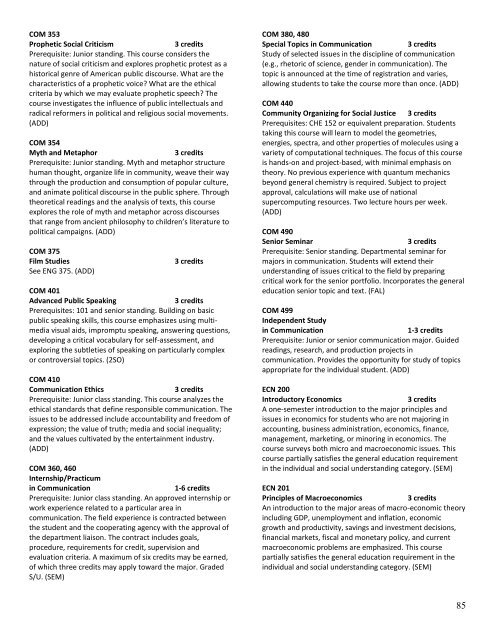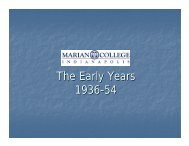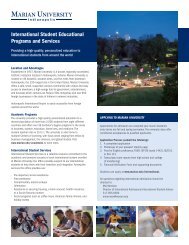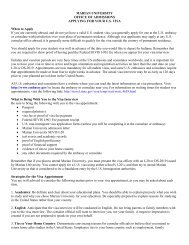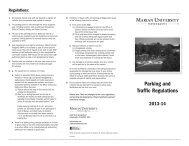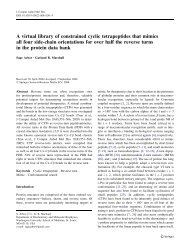2009-11 Marian University Course Catalog, fall 2010 edition
2009-11 Marian University Course Catalog, fall 2010 edition
2009-11 Marian University Course Catalog, fall 2010 edition
You also want an ePaper? Increase the reach of your titles
YUMPU automatically turns print PDFs into web optimized ePapers that Google loves.
COM 353<br />
Prophetic Social Criticism 3 credits<br />
Prerequisite: Junior standing. This course considers the<br />
nature of social criticism and explores prophetic protest as a<br />
historical genre of American public discourse. What are the<br />
characteristics of a prophetic voice? What are the ethical<br />
criteria by which we may evaluate prophetic speech? The<br />
course investigates the influence of public intellectuals and<br />
radical reformers in political and religious social movements.<br />
(ADD)<br />
COM 354<br />
Myth and Metaphor 3 credits<br />
Prerequisite: Junior standing. Myth and metaphor structure<br />
human thought, organize life in community, weave their way<br />
through the production and consumption of popular culture,<br />
and animate political discourse in the public sphere. Through<br />
theoretical readings and the analysis of texts, this course<br />
explores the role of myth and metaphor across discourses<br />
that range from ancient philosophy to children’s literature to<br />
political campaigns. (ADD)<br />
COM 375<br />
Film Studies 3 credits<br />
See ENG 375. (ADD)<br />
COM 401<br />
Advanced Public Speaking 3 credits<br />
Prerequisites: 101 and senior standing. Building on basic<br />
public speaking skills, this course emphasizes using multimedia<br />
visual aids, impromptu speaking, answering questions,<br />
developing a critical vocabulary for self-assessment, and<br />
exploring the subtleties of speaking on particularly complex<br />
or controversial topics. (2SO)<br />
COM 410<br />
Communication Ethics 3 credits<br />
Prerequisite: Junior class standing. This course analyzes the<br />
ethical standards that define responsible communication. The<br />
issues to be addressed include accountability and freedom of<br />
expression; the value of truth; media and social inequality;<br />
and the values cultivated by the entertainment industry.<br />
(ADD)<br />
COM 360, 460<br />
Internship/Practicum<br />
in Communication 1-6 credits<br />
Prerequisite: Junior class standing. An approved internship or<br />
work experience related to a particular area in<br />
communication. The field experience is contracted between<br />
the student and the cooperating agency with the approval of<br />
the department liaison. The contract includes goals,<br />
procedure, requirements for credit, supervision and<br />
evaluation criteria. A maximum of six credits may be earned,<br />
of which three credits may apply toward the major. Graded<br />
S/U. (SEM)<br />
COM 380, 480<br />
Special Topics in Communication 3 credits<br />
Study of selected issues in the discipline of communication<br />
(e.g., rhetoric of science, gender in communication). The<br />
topic is announced at the time of registration and varies,<br />
allowing students to take the course more than once. (ADD)<br />
COM 440<br />
Community Organizing for Social Justice 3 credits<br />
Prerequisites: CHE 152 or equivalent preparation. Students<br />
taking this course will learn to model the geometries,<br />
energies, spectra, and other properties of molecules using a<br />
variety of computational techniques. The focus of this course<br />
is hands-on and project-based, with minimal emphasis on<br />
theory. No previous experience with quantum mechanics<br />
beyond general chemistry is required. Subject to project<br />
approval, calculations will make use of national<br />
supercomputing resources. Two lecture hours per week.<br />
(ADD)<br />
COM 490<br />
Senior Seminar 3 credits<br />
Prerequisite: Senior standing. Departmental seminar for<br />
majors in communication. Students will extend their<br />
understanding of issues critical to the field by preparing<br />
critical work for the senior portfolio. Incorporates the general<br />
education senior topic and text. (FAL)<br />
COM 499<br />
Independent Study<br />
in Communication 1-3 credits<br />
Prerequisite: Junior or senior communication major. Guided<br />
readings, research, and production projects in<br />
communication. Provides the opportunity for study of topics<br />
appropriate for the individual student. (ADD)<br />
ECN 200<br />
Introductory Economics 3 credits<br />
A one-semester introduction to the major principles and<br />
issues in economics for students who are not majoring in<br />
accounting, business administration, economics, finance,<br />
management, marketing, or minoring in economics. The<br />
course surveys both micro and macroeconomic issues. This<br />
course partially satisfies the general education requirement<br />
in the individual and social understanding category. (SEM)<br />
ECN 201<br />
Principles of Macroeconomics 3 credits<br />
An introduction to the major areas of macro-economic theory<br />
including GDP, unemployment and inflation, economic<br />
growth and productivity, savings and investment decisions,<br />
financial markets, fiscal and monetary policy, and current<br />
macroeconomic problems are emphasized. This course<br />
partially satisfies the general education requirement in the<br />
individual and social understanding category. (SEM)<br />
85


